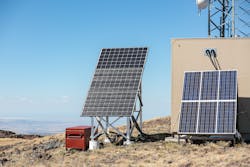NEC Requirements for Standalone Power Production Systems
Article 710 of the National Electrical Code (NEC) provides the requirements for power systems that operate in island mode and installations not connected to a power production and distribution network. These are in contrast to the interconnected systems covered by Article 705.
For example, a remote building may have its own solar power or wind supply. When it’s impractical to run utility power, this arrangement is often a solution. But even when utility power is available on-site, there may be a building or area with its own off-grid power system. Microgrids are an increasingly common example of this arrangement.
Article 710 takes up slightly less than a full page and features three major points:
- The power source(s) must be identified by a permanent plaque or directory at each service equipment location or at an approved readily visible location [710.10].
- Premises wiring must meet the same NEC requirements as similar installations supplied by feeder or a service [710.15].
- Size the circuit conductors between a standalone source and a structure’s disconnecting means based on the sum of the output ratings of the standalone sources [710.15(B)].
About the Author

Mark Lamendola
Mark is an expert in maintenance management, having racked up an impressive track record during his time working in the field. He also has extensive knowledge of, and practical expertise with, the National Electrical Code (NEC). Through his consulting business, he provides articles and training materials on electrical topics, specializing in making difficult subjects easy to understand and focusing on the practical aspects of electrical work.
Prior to starting his own business, Mark served as the Technical Editor on EC&M for six years, worked three years in nuclear maintenance, six years as a contract project engineer/project manager, three years as a systems engineer, and three years in plant maintenance management.
Mark earned an AAS degree from Rock Valley College, a BSEET from Columbia Pacific University, and an MBA from Lake Erie College. He’s also completed several related certifications over the years and even was formerly licensed as a Master Electrician. He is a Senior Member of the IEEE and past Chairman of the Kansas City Chapters of both the IEEE and the IEEE Computer Society. Mark also served as the program director for, a board member of, and webmaster of, the Midwest Chapter of the 7x24 Exchange. He has also held memberships with the following organizations: NETA, NFPA, International Association of Webmasters, and Institute of Certified Professional Managers.
